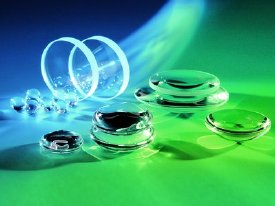Apr 12 2011
At LASER, World of Photonics, SCHOTT will be presenting its expanded range of HT glasses. These variants of standard optical glass offer extremely high internal transmission in the visible and especially the blue-violet spectral range. This allows for the light yield to be increased and improves the color fastness. Furthermore, errors in images caused by the thermal lens effect are significantly fewer.
Transmission is one of the most important properties of optical glasses. However, the higher the refractive index of the glass, the lower it is in the blue-violet range of the visible spectrum. SCHOTT has now succeeded in developing glasses that offer outstanding internal transmission, despite their high refractive index. These new glass versions can be recognized by the additions “HT” and “HtUltra”.
 The optics division has been manufacturing lead and arsenic-free glasses for over ten years.
The optics division has been manufacturing lead and arsenic-free glasses for over ten years.
Highly pure raw materials and optimal melting conditions have made this improvement of existing optical glasses possible. For example, the HT version of N-BK7 (nd = 1.51680, vd = 64.17) has an internal transmission of ôi from 0.998 in a thickness of 10 mm and a wavelength of 400 nm. None of the comparable glasses from other vendors achieve evenly high transmission in the visible range.
Due to their high light yield, HT and HTUltra glasses are ideally suited for use in the lenses of reflex and TV cameras and fluorescence microscopy. In binoculars, they offer outstanding viewing, even at twilight, and reduce the thermal lensing effect in applications that use high luminous flux, such as 3-D cinema projectors, because the glass absorbs hardly any light at all. In total, the range has now been expanded from five to include eleven HT glasses that are all lead and arsenic-free. The portfolio now includes the versions N-BK7HT, N-SK2HT, NSCHOTT LASF9HT, N-LASF45HT, N-SF57HTUltra and N-SF6HT. SCHOTT offers finished polished and coated components that are made of these glasses, including windows, prisms and lenses that meet specific customer needs, but also blanks, bars or blocks.